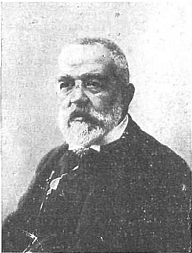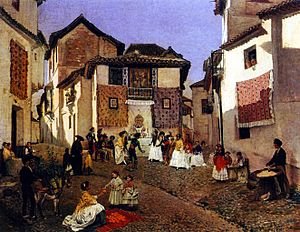Plácido Francés y Pascual facts for kids
Quick facts for kids
Plácido Francés y Pascual
|
|
|---|---|

Plácido Francés y Pascual, from Nuevo Mundo
|
|
| Born | April 1834 |
| Died | 12 December 1902 Madrid, Spain
|
| Nationality | Spanish |
| Known for | Painter |
| Movement | Orientalist; Costumbrista |
Plácido Francés y Pascual (born April 1834 – died 12 December 1902) was a Spanish painter. He was known for his portraits, historical paintings, and scenes of everyday life, which is called Costumbrista art.
Contents
A Spanish Painter's Life
Plácido Francés y Pascual was born in Alcoy. He started learning art in Valencia. In 1854, he moved to Madrid to finish his art studies.
Becoming a Professor
In 1861, Plácido became a professor. He taught drawing at the "Escuela Superior de Bellas Artes de Valencia." This means the Higher School of Fine Arts in Valencia. One of his most famous students was Antonio Cortina Farinós.
Painting Palaces
Plácido Francés y Pascual also worked on decorating important buildings. In 1862, he created beautiful designs for the "Palacio del Marqués de Dos Aguas" in Valencia. This was a grand palace. Four years later, he painted special ceiling pictures for the palace's ballroom. These paintings showed Venus, a goddess, with small, winged figures called putti and cherubs. He also decorated other palaces, like those belonging to the Duke of Santoña and the Marqués de Larios.

Moving to Madrid and Gaining Fame
In 1870, Plácido moved to Madrid for good. There, he helped start two important art groups. One was the Círculo de Bellas Artes, which is an art circle or club. The other was the "Asociación de Acuarelistas de Madrid," a group for watercolor artists.
He also became a professor at the Real Academia de Bellas Artes de San Fernando. This was a very important art academy. Plácido began showing his paintings at the yearly National Exhibition of Fine Arts. He won medals there in 1871, 1890, and 1892. His drawings were often printed in a popular magazine called Blanco y Negro. In 1882, he received a special award, the Cross of the Order of Carlos III.
Family and Legacy
Plácido Francés y Pascual passed away in Madrid when he was 68 years old. Two of his children also became painters. His daughter, Fernanda Francés y Arribas (1862-1939), was known for painting flowers. His son was Juan Francés y Mexía. Plácido's cousin, Emilio Sala, was also a painter and had been one of his students.
See also
 In Spanish: Plácido Francés y Pascual para niños
In Spanish: Plácido Francés y Pascual para niños
 | Bessie Coleman |
 | Spann Watson |
 | Jill E. Brown |
 | Sherman W. White |

